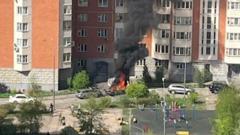The case reflects growing concerns over political violence in Japan following recent high-profile attacks.
**Japanese Court Sentences Man to 10 Years for Attempted Murder of Former Prime Minister**

**Japanese Court Sentences Man to 10 Years for Attempted Murder of Former Prime Minister**
A man has been sentenced for attacking Fumio Kishida with explosives during a political event in 2023.
In a significant outcome for the Japanese legal system, a western Japan court sentenced Ryuji Kimura, a 25-year-old man, to ten years in prison for his attempted murder of former Prime Minister Fumio Kishida. The incident, which occurred in April 2023, involved Kimura throwing a homemade bomb at Kishida while the premier addressed supporters at an event in Wakayama.
The court found Kimura guilty on multiple charges, including possession of explosives and attempted murder. Prosecutors presented evidence indicating that Kimura’s intent was to kill Kishida, motivated by a desire for public attention after his social media posts failed to garner engagement. Initially, prosecutors sought a 15-year sentence, emphasizing the potential lethality of the device which experts confirmed could have resulted in death had it detonated in proximity to the prime minister.
The attack garnered widespread media attention as it was a striking act of violence in a nation known for its low crime rates. This incident occurred less than a year after the assassinated former Prime Minister Shinzo Abe, highlighting escalating political tensions. Abe was shot and killed in July 2022 during a campaign event in Nara, close to Wakayama. The security failings regarding Abe’s protection raised alarm bells, underscoring the vulnerability of public figures in Japan.
At the time of the attack on Kishida, quick thinking by security personnel ensured the premier was escorted to safety before the explosion, which injured two bystanders nearby. Investigation revealed that Kimura had a second device and additional explosives with him, suggesting he had premeditated his actions.
Following the sentencing, the court criticized Kimura for endangering public safety, stating that such attacks against political leaders instigate significant societal anxiety. Fumio Kishida had previously held office until October, marking an end to a turbulent political period in the country.
The case has prompted discussions on national security measures for politicians in Japan, as the culture of public safety faces scrutiny from recent violent events that challenge the country's long-standing peace.
The court found Kimura guilty on multiple charges, including possession of explosives and attempted murder. Prosecutors presented evidence indicating that Kimura’s intent was to kill Kishida, motivated by a desire for public attention after his social media posts failed to garner engagement. Initially, prosecutors sought a 15-year sentence, emphasizing the potential lethality of the device which experts confirmed could have resulted in death had it detonated in proximity to the prime minister.
The attack garnered widespread media attention as it was a striking act of violence in a nation known for its low crime rates. This incident occurred less than a year after the assassinated former Prime Minister Shinzo Abe, highlighting escalating political tensions. Abe was shot and killed in July 2022 during a campaign event in Nara, close to Wakayama. The security failings regarding Abe’s protection raised alarm bells, underscoring the vulnerability of public figures in Japan.
At the time of the attack on Kishida, quick thinking by security personnel ensured the premier was escorted to safety before the explosion, which injured two bystanders nearby. Investigation revealed that Kimura had a second device and additional explosives with him, suggesting he had premeditated his actions.
Following the sentencing, the court criticized Kimura for endangering public safety, stating that such attacks against political leaders instigate significant societal anxiety. Fumio Kishida had previously held office until October, marking an end to a turbulent political period in the country.
The case has prompted discussions on national security measures for politicians in Japan, as the culture of public safety faces scrutiny from recent violent events that challenge the country's long-standing peace.




















